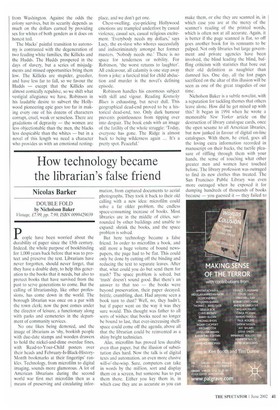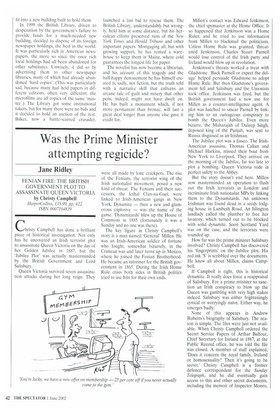How technology became the librarian's false friend
Nicolas Barker
DOUBLE FOLD by Nicholson Baker
Vintage, £7.99, pp. 7.99, ISBN 0099429039
People have been worried about the durability of paper since the 15th century. Indeed, the whole purpose of bookbinding for 1,000 years back before that was to protect and preserve the text, Librarians have never forgotten, should never forget, that they have a double duty, to help this generation to the books that it needs, but also to protect books that have survived from the past to serve generations to come, But the calling of librarianship, like other professions, has come down in the world. The borough librarian was once on a par with the town clerk; now the post comes under the director of leisure, a functionary along with parks and cemeteries in the department of community services.
No one likes being demoted, and the image of librarians as shy, bookish people with due-date stamps and wooden drawers to hold the nickel-and-dime overdue fines, with Read-to-Your-Child posters over their heads and February-Is-Black-HistoryMonth bookmarks at their fingertips' rankles. Technology, from microfilm to digital imaging, sounds more glamorous. A lot of American librarians during the second world war first met microfilm then as a means of preserving and circulating infor
mation, from captured documents to aerial photographs. They took it back to their old calling with a new idea: microfilm could solve a far older problem, the endless space-consuming increase of books. Most libraries are in the middle of cities, surrounded by other buildings and unable to expand: shrink the books, and the space problem is solved.
But here technology became a false friend. In order to microfilm a book, and still more a huge volume of bound newspapers, the page had to be flat. This could only be done by cutting off the binding and reducing the text to separate leaves. After that, what could you do but send them for trash? The space problem is solved, but 'trash' doesn't sound good. But there's an answer to that too — the books were beyond preservation, their paper decayed, brittle, crumbling, dust. Had anyone seen a book turn to dust? Well, no, they hadn't, but if paper went on the way it was they sure would. This thought was father to all sorts of wishes: that books need no longer be bound to last, that ever-increasing shelfspace could come off the agenda, above all that the librarian could be reinvented as a shiny bright technician.
Alas, microfilm has proved less durable even than paper, but the illusion of substitution dies hard. Now the talk is of digital texts and automation, an even more elusive will-o'-the-wisp. Sure, computers can take in words by the million, sort and display them on a screen, but someone has to put them there. Either you key them in, in which case they are as accurate as you can make them, or else they are scanned in, in which case you are at the mercy of the scanner's reading of the printed words, which is often not at all accurate. Again, it is better if the page scanned is flat, so off goes another book for its remnants to be pulped. Not only libraries but large government and private agencies have been involved, the blind leading the blind, baffling criticism with statistics that bore out their old definition as naughtier than damned lies. One day, all the lost pages sacrificed on the altar of this illusion will be seen as one of the great tragedies of our time.
Nicholson Baker is a subtle novelist, with a reputation for tackling themes that others leave alone. How did he get mixed up with this? It began in 1994 when he wrote a memorable New Yorker article on the destruction of library catalogue cards, once the open sesame to all American libraries, but now junked in favour of digital on-line catalogues. With them, he cried, goes all the loving extra information recorded in manuscript on their backs, the tactile pleasure of riffling through them with your hands, the sense of touching what other greater men and women have touched before. The library profession was outraged to find its new clothes thus treated. The San Francisco Public Library was even more outraged when he exposed it for dumping hundreds of thousands of books because — you guessed it — they failed to fit into a new building built to hold them.
In 1999 the British Library, driven to desperation by the government's failure to provide funds for a much-needed new building, decided to dispose of its foreign newspaper holdings, the best in the world. It was particularly rich in American newspapers, the more so since the once rich local holdings had all been abandoned for other substitutes. Unwisely, it did so by advertising them to other newspaper libraries, many of which had already abandoned 'hard copies'. (This was particularly sad, because many had held papers in different editions, often very different; the microfilms are all copies of the same 'master'.) The Library got some institutional takers, but for many there were no bids and it decided to hold an auction of the rest. Baker, now a battle-scarred crusader,
launched a last bid to rescue them. The British Library, understandably but wrongly, held him at some distance, but his herculean efforts preserved runs of the New York Times and Herald Tribune and other important papers. Mortgaging all, but with growing support, he has rented a warehouse to keep them in Maine, where cold guarantees the longest life for paper.
The novelist has now become a librarian, and his account of this tragedy and the half-happy denouement he has himself created is, sadly, not fiction, but the truth told with a narrative skill that enlivens an arcane tale of guilt and misery that other pens, indeed, might not have dwelt on. He has built a monument which, if not more permanent than bronze, will last a great deal longer than anyone else gave it credit for.







































































 Previous page
Previous page